EngageMeNT - Issue 1
Tony's Message
Welcome to the first edition of EngageMeNT, a monthly Department of Education (DoE) newsletter showcasing and celebrating achievements from within the Engagement and Partnerships (E&P) division.
E&P comprises six project areas – Office of the General Manager, Indigenous Education and Operations (IEO) , Community Engagement and Local Decision Making (CELDM), Student Engagement, Transition Support Unit (TSU) and International Education and Non-Government School Services – and recently marked its first year of operation.
In this time, the division has made giant leaps in improving the delivery of education services to students in the Northern Territory.
More and more schools are embracing Local Engagement and Decision Making (LEaD) committees, empowering communities to have a greater say around how education is delivered.
A dedicated focus on student engagement is delivering outstanding results - during this year’s Age Grade Census the passive roll was reduced by 477 young people.
TSU is also making great strides with record numbers of Territory students now attending boarding schools locally and interstate. Retention of boarders has increased by 12 per cent to 68 per cent.
The IEO team oversees delivery of the Indigenous Education Strategy, areas of Indigenous education policy and provides secretariat function for various groups including the Aboriginal and Torres Strait Islander Education Group and the Jabiru Education and Training Sub-Committee.
There’s exciting things happening in the international education space, evidenced by a recent run of study tours which have showcased our education system to students, teachers and education leaders from overseas. There has been an increase of 19.6% - subclass 500 visa holders at NT government schools from 18 June (51 students) to 20 October (61 students).
At a staffing level, the E&P workforce continues to mature and evolve.
Aboriginal employees now make up 32 per cent of E&P staff. Aboriginal people currently account for 33 per cent of the Northern Territory’s population – the E&P division now reflects that.
We hope you enjoy reading the new monthly newsletter and encourage all E&P staff to canvass content ideas, submit story leads and provide images of the amazing work they do for publication in future issues.
Communities embracing LEaD committees
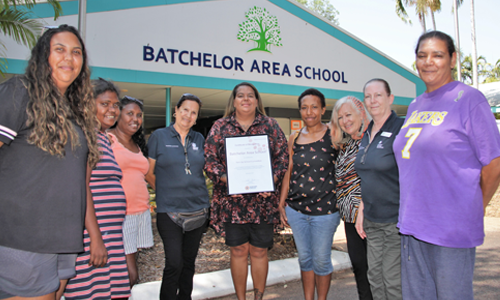 Batcheleor Area School has been enshrined as the first Northern Territory school to be formally recognised for establishing a Local Engagement and Decision Making (LEaD) committee.
Batcheleor Area School has been enshrined as the first Northern Territory school to be formally recognised for establishing a Local Engagement and Decision Making (LEaD) committee.
Parents and families were joined by school and Department of Education staff at a recent LEaD committee signing ceremony.
LEaD committees are being established in remote and very remote NT communities to help build capacity of Aboriginal parents to work with their local school to inform and influence education decisions that impact their children.
Schools at Amanbidji, Belyuen, Borroloola, Bulla Camp, Kalkaringi, Pine Creek, Robinson River, Wugularr and Ti-Tree have also established LEaD committees.
Batchelor Area School’s LEaD Committee members chose the name Yarn Up School Committee to reflect how discussions are held in their community.
Yarn Up LEaD Committee chairperson Deanne Broome said while setting up the LEaD committee seemed a daunting process, the determination of committee members was paying off.
“From this day forward Batchelor Area School Yarn Up LEaD committee will progress with community members, parents, carers, guardians and children.
“This determination will benefit and strengthen our community and start linking mothers, fathers and children for us to share ideas for our community”
Yarn Up LEaD Committee has hit the ground running with planning for a host of school-based community events underway.
A breakfast club, school attendance discos and a young mums and bubs program are among concepts already in the pipeline, while the committee’s also working to implement after-school sports and school attendance discos and have greater input around NAIDOC celebrations.
The department’s Community Engagement and Local Decision Making (CELDM) team is currently working closely with 54 remote and very remote communities around the establishment of LEaD committees.
Community Engagement and Local Decision Making (CELDM) director Joe Brown said it was exciting to see so many communities keen to have LEaD committees installed.
“I’ve been very impressed by the willingness of remote parents to take on a greater involvement around how education is delivered in their communities,” he said.
In addition to consultations around LEaD committees, seven schools (Gunbalanya, Yambirrpa School Council – 2 schools, Warlpiri Triangle – 4 schools) have self-identified to become community-led schools.
The community-led schools model explores collaborative ways of leading the business of education in a community through strong governance, community-led decision making and accountability.
Camps kick-starts boarding school journey
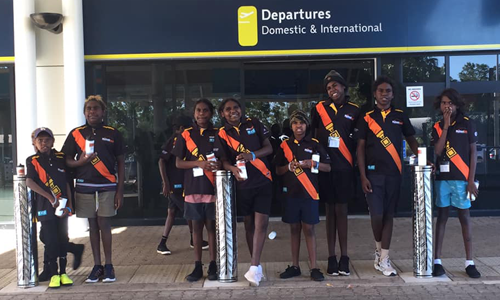 Students from remote communities in Central Australia and the Barkly have taken part in week-long camps in Darwin to help them prepare for boarding school life.
Students from remote communities in Central Australia and the Barkly have taken part in week-long camps in Darwin to help them prepare for boarding school life.
Four Transition Support Unit (TSU) camps were held at the Michael Long Learning and Leadership Centre (MLLLC) during terms 3 and 4.
TSU works with identified community schools, students and families to effectively plan and prepare for residential secondary schooling.
TSU Director Brenton Toy said the camps played a vital role in readying remote students for boarding school.
“For a lot of these young people it’s been their first time on a plane or first time out of community, first time in a big city or first time staying away from family.
“These camps provide that orientation of getting used to being away from those sorts of things, forming relationships with new people and coming out of your comfort zone.”
A jam-packed itinerary featured guest speakers who focused on positive decision making and good nutrition, while students also went on tours of boarding facilities at Haileybury Rendall School and St Johns College and visited Charles Darwin University.
The group also took part in a session aimed at building up students’ confidence in an airport setting.
“We visited Darwin International Airport and that was about familiarising kids with terminals and gates and how to read itineraries and boarding passes,” Mr Toy said.
“Airports can be quite daunting and can cause a lot of anxiety to boarding students given there are often multiple legs, stopovers and long journeys during peak holiday times. TSU deploys staff to the airports with itineraries and travel lists so we know who’s travelling
where. They can co-ordinate transfers between the main terminal and charter companies and provide general assistance for students in making their connecting flights.
“We also liaise with the schools, charter companies and families just to make sure all students are getting on the right planes and going back to where they’re supposed to.”
TSU supports 493 students currently enrolled in boarding schools or schools with boarding facilities – 296 are studying in the NT and 197 interstate.
TSU is also supporting a further 450 very remote students and their families to plan and prepare for boarding school. Through intensive support provided to boarders and their families, TSU now has a student retention rate of 68 per cent.
New faces strengthen reference committee
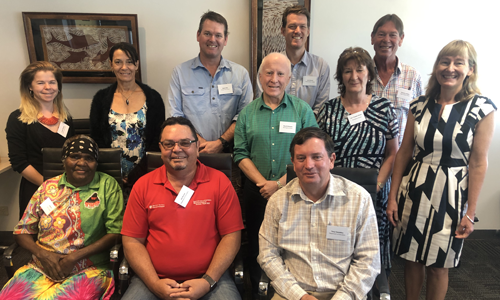 Four Northern Territory Aboriginal organisations now have voices on the Community Engagement and Indigenous Education Strategy Reference Committee.
Four Northern Territory Aboriginal organisations now have voices on the Community Engagement and Indigenous Education Strategy Reference Committee.
The committee provides strategic advice around the development, implementation and evaluation of actions which empower communities to be more involved in the education of their children.
Delegates from the Northern Land Council and Central Land Council recently joined the reference group, along with representatives from Aboriginal Peak Organisations NT and the Warlpiri Education Triangle Trust.
General Manager of Department of Education’s Engagement and Partnerships division Tony Considine said it was important for land councils and peak Aboriginal bodies to have opportunities to be involved in decision making that impacts education in remote communities.
“It’s vital Aboriginal peak bodies have an opportunity to collaborate with principals and corporate staff and provide their input and feedback around delivering government commitments to improve education outcomes for remote Aboriginal students.
“This inclusive approach gives the peak bodies a seat at the table as we continue to assist remote Aboriginal students and their families to engage, grow and achieve on their education journeys.”
Translated books creating a buzz
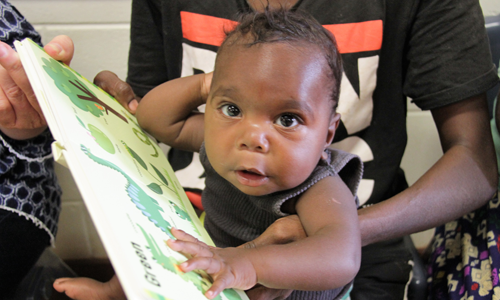 The delivery of thousands of children’s books translated into traditional language and Kriol is set to provide a boost to early learning in remote communities across the Northern Territory.
The delivery of thousands of children’s books translated into traditional language and Kriol is set to provide a boost to early learning in remote communities across the Northern Territory.
The Book Buzz program, which is run by the Indigenous Literacy Foundation (ILF), recently visited Ngukurr’s Families as First Teachers (FaFT) program where the new reading resources were an instant hit with young children and their families.
Three books have been translated, with parents from Ngukurr FaFT converting children’s classics “Head, Shoulders, Knees and Toes” and “Who’s Hiding?” into Kriol.
Another well-known title, “The Very Hungry Caterpillar”, has been translated to Yolngu Matha.
ILF executive director Karen Williams said translating books into local languages improved learning outcomes.
“All the research worldwide shows that if you learn to read in your first language you will go on to be more successful at school,” Ms Williams said.
ILF plans to distribute 5000 translated children’s books to 43 FaFT sites across the Territory.
“What we’re trying to do with this program is develop that real love of reading like we have and take for granted,” Ms Williams said.
“We take that story time for granted and don’t realize how difficult it is for communities who don’t have books in their homes and also don’t have books in their language and they don’t have books that reflect their lives.”
The FaFT team at Ngukurr is now working on their next exciting project – translating “The Very Cranky Bear” into Kriol.
FaFT is a key project under the Northern Territory Government’s Indigenous Education Strategy 2015-2024. It's is an evidence-based quality early learning and family support program which improves the lifelong education, health and wellbeing outcomes for young children from birth to four years of age and their families.
FaFT also provides culturally appropriate parenting support and early intervention strategies to increase the capacity of parents to enhance their children’s learning and development. Each FaFT site is staffed by a qualified early childhood teacher and a local Aboriginal Family Liaison Officer.
Sister-school visits an eye-opener
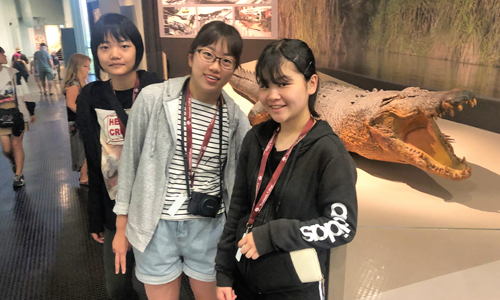 Long-running sister-school arrangements between Northern Territory Government and Japanese schools continue to foster cross-cultural ties between students and teachers from vastly different backgrounds.
Long-running sister-school arrangements between Northern Territory Government and Japanese schools continue to foster cross-cultural ties between students and teachers from vastly different backgrounds.
A 54-strong delegation from three Japanese high schools recently spent a week in the Top End, hosted by their sister-schools Taminmin College, Palmerston College and Dripstone Middle School.
The visit continued a tradition of sister-school partnerships between NT and Japanese schools which have been running for more than 25 years.
The students, who were from schools in the Wakamaya Prefecture, south of Tokyo, immersed themselves in local school curriculum with studies in mathematics, social sciences, Aboriginal studies, English, physical education and home economics.
“There were many different classes through the day and each class has its unique style with students able to work collaboratively with their classmates and also freely clarify task expectations with the teacher,” Mr Takakiyo Hayashi from Japan’s Board of Education said.
Students were hosted by local families during their Top End stay with many preparing and enjoying local cuisine such as pizza, tacos and lasagne at meal times.
And no visit to the Top End is complete without a close-up encounter with a saltwater crocodile. Students got to revel in the might of the NT Museum and Art Gallery’s resident stuffed croc Sweetheart and also got up close and person with living and breathing crocodilians on an Adelaide River jumping crocodile tour.
The International Services team within Department of Education continues to grow its collaborations with overseas study tour operators, encouraging groups of school-aged students to participate in short-term education programs within Northern Territory Government schools.
Engagement and Partnerships divisional conference
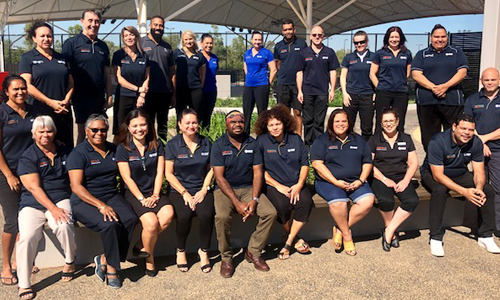 The Engagement and Partnerships Division held its biannual divisional conference during August.
The Engagement and Partnerships Division held its biannual divisional conference during August.
The purpose of the conferences are to get to know each other within the division and to better facilitate working together as a team. This was our third conference since becoming a division through the 2018 organisational realignment. One of the key aims was to develop a divisional values statement that we can reflect on during our work. As a division we developed the following statement:
“We grow a supportive, respectful and responsive culture, which has the child, family & community at the heart of everything we do. Through authentic, intentional partnerships we will increase educational outcomes & empower future leaders.”
This values statement now sits at the forefront of what we do and will help drive our work.
Give feedback about this page.
Share this page:
URL copied!